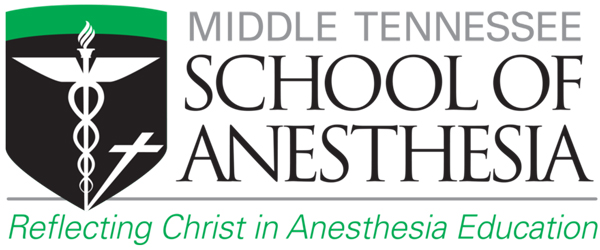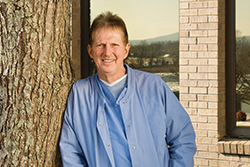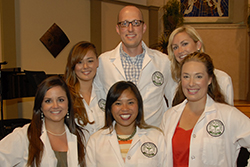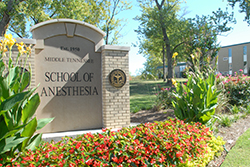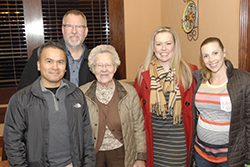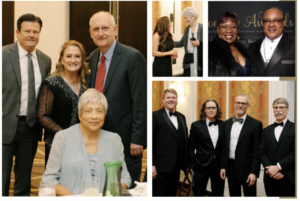Airways
February 2024
MTSA Team Conducts Specialized Training in Guyana
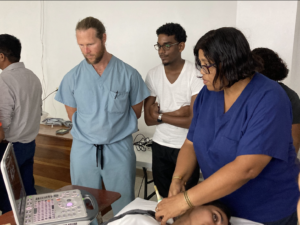
 A team of volunteers from Middle Tennessee School of Anesthesia recently spent a week training and educating a wide variety of anesthesia providers at Georgetown Public Hospital in Guyana. Led by Christian Falyar, DNP, CRNA, MTSA’s Director of the Acute Surgical Pain Management Fellowship, and Rob Taylor, MD, anesthesiologist at Sumner Regional Medical Center, the group conducted five point-of-care ultrasound (PoCUS) workshops for 43 anesthesia providers.
A team of volunteers from Middle Tennessee School of Anesthesia recently spent a week training and educating a wide variety of anesthesia providers at Georgetown Public Hospital in Guyana. Led by Christian Falyar, DNP, CRNA, MTSA’s Director of the Acute Surgical Pain Management Fellowship, and Rob Taylor, MD, anesthesiologist at Sumner Regional Medical Center, the group conducted five point-of-care ultrasound (PoCUS) workshops for 43 anesthesia providers.
The team also included MTSA graduate Lani Hensel, DNAP, CRNA, and Jonathan McGarrety, CRNA in MTSA’s Pain Fellowship and Doctoral Completion programs. Hensel is the 2022 MTSA President’s Medal winner for her project, “Simulation to Meet Continuing Education Needs in Low-Resource Countries: A Survey of Guyana Nurse Anesthetists.” Hensel and McGarrety provided curriculum and facilitated class work with the nursing students in the anesthesia program at Georgetown.
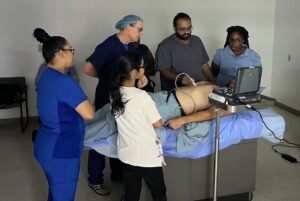
The PoCUS workshops were attended by anesthesia nurses, physicians, residents and trainees from across the country and covered essential point of care studies a provider could use in everyday clinical practice.
After the PoCUS workshops, the physicians in Georgetown invited Falyar and Taylor to two local hospitals where they conducted some of the studies with patients. These included gastric ultrasound scans, cardiac studies and central line insertion. In addition, the pair were able to participate in observations in the OR.
“It’s one thing to practice the studies on young healthy models and see what ‘normal’ looks like, but it’s another to perform them in a clinical setting on someone with pathology and comorbidities,” Falyar said. “We were able to go from bed to bed in the intensive care unit, talking about each patient’s diagnosis and comorbidities, which led to performing PoCUS studies that would give them the information they needed. Most of the providers had never used this technology before in their practice, and they could immediately see the benefit.”
The main focus of Taylor’s role was helping with vascular access. “That’s an area that can really help with any anesthesia provider or medical professional. Getting that access reliably with ultrasound can really make a big difference,” he said, adding that PoCUS continues to have great potential as it enters more into daily practice.
“I felt very privileged and honored to go to Guyana and participate in this project,” Taylor said. “I’ve been to Haiti with MTSA a couple times, and this was a different approach – more focused on teaching providers instead of helping patients directly. The importance of the mission to Guyana is being able to share knowledge via training and education with a medical community in another country. Chris Hulin, Lani and Jonathan were a big part of that with the classroom education and building curriculum. And Christian put together a top-notch PoCUS workshop.”
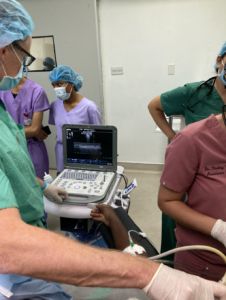
Falyar pointed out that PoCUS is a relatively new technology to providers in Guyana and that ultrasound machines are not as readily accessible and mobile in comparison to the United States. However, he was impressed with the learners and their preparation via the online content provided beforehand.
“I’ve been a part of humanitarian missions with the military in some very austere environments. This was the first time I’ve been to Guyana and focused on providing education, as opposed to direct patient care. It’s a valuable approach when we can train providers to perform these studies and help them improve patient care on a large scale, creating a situation where it can be perpetuated. Seeing how this would help them in their practice was the most rewarding part of our work there,” Falyar added.
“I would like to make public our gratitude to the professors who taught the ultrasound workshops,” said Dr. Fernando Ramirez Tellez, head of the anesthesia department and ICU at Georgetown Public Hospital. “It was a unique opportunity to see the family of anesthesia providers from the entire nation together learning. The workshop has greatly impacted positively in the evaluation of patients. All participants have expressed to me the usefulness and positive impact of the workshop at all levels. Thank you, on behalf of the family of Guyanese anesthesia providers.”
MTSA continues seeking support for its Mission Initiatives locally and across the globe. For more information, visit mtsa.edu.
President's Message: New Opportunities to Grow as a CRNA
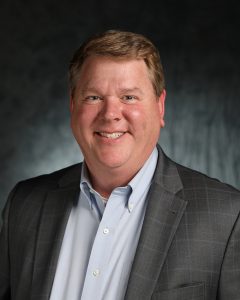
Chris Hulin, DNP, MBA, CRNA
President
With the New Year in full swing, Middle Tennessee School of Anesthesia’s faculty, staff and administration are engaged in the important work of training CRNAs and helping to ensure they have all the resources they need to be successful.
So when anesthesia providers face challenges in their career, we jump into action. Perhaps one of the most significant issues keeping CRNAs awake at night is the ever-evolving relationships with the healthcare systems in which they work. To that end, we saw a need to better equip CRNAs to handle the business side of anesthesia. As you’ll see in this issue of Airways, we are thrilled to be partnering with Larry Hornsby in launching the Hornsby Business Institute at MTSA, which provides all the leadership skills a CRNA needs to handle the non-clinical intricacies of running an anesthesia service.
Another fundamental aspect of preparedness for CRNAs is ensuring rigorous educational experiences. Many in our profession have found their calling in the classroom, teaching in anesthesia programs across the globe. As a result, we developed the Nurse Anesthesia Educator Track at MTSA, a 12-month course of study that prepares students to function in this vital role.
This track prepares students for the Certified Nurse Educator Exam and is able to be completed post-masters degree while earning a Doctorate of Nurse Anesthesia Practice degree or as a certificate program without the Doctoral degree.
These new additions to MTSA’s programs follow our track record with the Acute Surgical Pain Management Fellowship as well as regional anesthesia workshops – maintaining a commitment to advancing the CRNA profession. If your plans in 2024 include career growth, I invite you to contact us and find out which program best fits your goals!
Continuing Education
This issue of Airways features a Continuing Education insert entitled, “The Anesthesia Provider’s Role in Reducing Risk of Relapse in Surgical Patients with Substance Use Disorder,” by authors Jordan Frenz Billings, DNAP, CRNA, Michael Tennier, DNAP, CRNA, and Hallie Evans, DNP, CRNA.
In addition, the following CE articles are available from previous Airways issues:
- The Role of Regional Anesthesia in Treatment of Phantom Limb Pain – CE expires 7/10/2026
- The Role of the Transnasal Sphenopalatine Ganglion Block in the Management of Postdural Puncture Headaches – CE expires 10/31/2025
- Ultrasound Guided Fascial Plane Block for Rib Fracture Pain – CE expires 6/30/2025
To access these CE articles, please visit mtsa.edu/ce
Service in Action
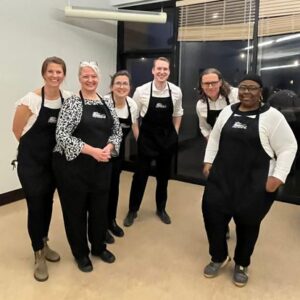
MTSA faculty and staff helped with FiftyForward’s Meals On Wheels program for those who may not have access to food in emergency situations. Recipients received bags with encouraging handwritten notes.
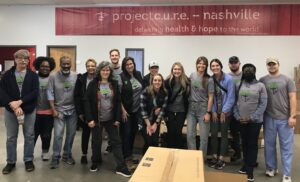
Students had an opportunity to volunteer with Project CURE at their warehouse in Nashville. Volunteers sorted and packaged donated medical supplies that were sent to doctors and nurses in more than 135 countries.
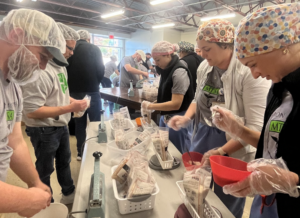
Students in the 2025 Practice Doctorate cohort worked together with MTSA staff and faculty to package 25,000 meals for Rise Against Hunger which were sent to those in need across the globe.

Volunteers went to the Bridge Ministries warehouse to help with a wide range of tasks, such as sorting new food shipments, bagging snacks for the Bridge to Kids program, sorting clothes and re-stacking pallets.
Missions Update
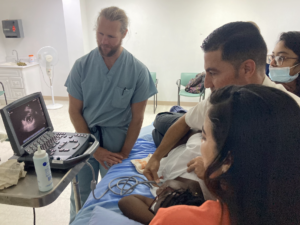
MTSA’s Mission Initiatives continue to support a range of efforts in Guatemala and Guyana. Students and faculty volunteered their time and traveled to these locations, providing much needed assistance.
“On behalf of MTSA, I want to thank everyone who has contributed financially to our Mission Initiatives throughout the year, whether it was at a special event or by serving the needs of those locally and around the globe,” said MTSA President Chris Hulin.
Unfortunately, logistics have prevented MTSA from the planned trip to Peru this year. However, the School is continuing its relationship with the People of Peru Project and looking forward to the opening of the new operating rooms and facility.
MTSA’s work in Guyana continues in partnership with the Institute of Health Science Education (a department of the Georgetown Public Hospital Corporation) and the University of Guyana in advancing nurse anesthesia practice. (Read more about the efforts in Guyana in this issue’s cover story.)
Mission in Guatemala
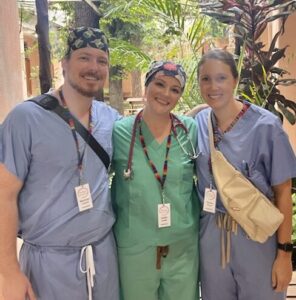
MTSA graduate Caitlin Douglas served on a mission trip to Guatemala. (l to r) Maclean Carpenter, Caitlin Douglas and Caroline Groover.
Tim Jones, the CRNA trip sponsor, said, “The Guatemala trip was a great success providing anesthetics to 81 surgical cases. MTSA’s three nurse anesthesia residents, MacLean Carpenter, Caitlin Douglas and Caroline Groover, were excellent providers who stepped up to the plate providing independent anesthesia and PNBs.”
“I had never been on a mission trip or even out of the country for that matter. It was such a great experience! I am so grateful that MTSA helped provide me with this opportunity that I will truly never forget. I cannot wait to serve on more mission trips in the future, now that I am no longer a student and have become a CRNA.” –MTSA graduate Caitlin Douglas
Student Standouts
MTSA SRNAs receive hands-on experience at a variety of clinical sites, but they also have the opportunity to make an impact on the patients they serve. We are pleased to share these comments received from clinical sites showcasing the skill and compassionate care of these SRNAs.
Congratulations to Hannah Rademacher for receiving the “SRNA of the Year” award at VUMC!
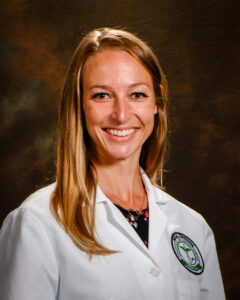
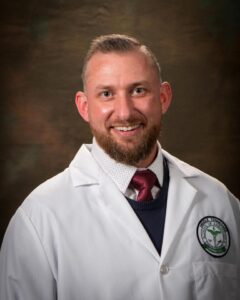
Steven Cuzzilla
I’ve had two experiences now where Steven had an excellent energy and did an excellent job with epidural placement. He’s quick and thorough, upbeat, but also gentle and reads the energy of the room well. Having great bedside manner is absolutely key, and he hits that mark. My last client who worked with him remarked to me that she remembered how gentle and kind he was. That’s huge!
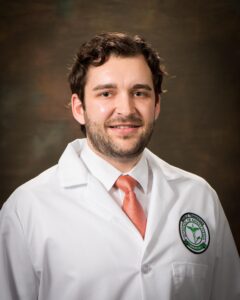
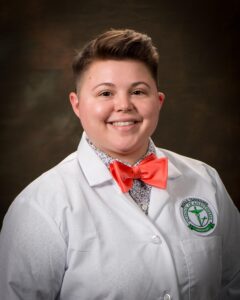
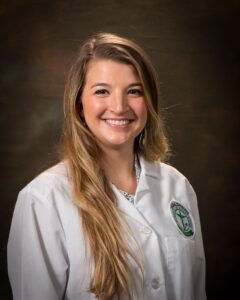
Ryan Joiner, Taylor Knight and Britney Patterson,
While in a stairwell this morning, another employee fell down the stairs and hit her head. Britney, Ryan and Taylor went to her aid as she was found taking agonal breaths and barely conscious. They assisted her to the emergency room where she was promptly intubated and found to have a cerebral hemorrhage with a midline shift. Even though I’m not sure what her outcome is going to be, she would not have a chance of survival if it had not been for their quick thinking and prompt action.
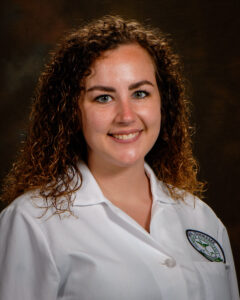
Dana Morris
I want to send my appreciation to Dana. Our late shift SRNA needed to leave work for a family emergency. Dana’s response to staying late and helping was, “I am here for whatever help you need.” That is the kind of dedication, especially for a late shift, was very appreciated. Upon her graduation, I know she will be a tremendous asset to our profession. Thanks again for your great attitude.
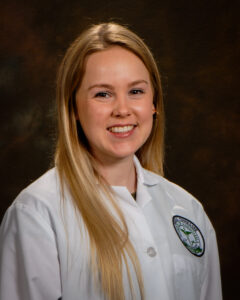
Alexa Nieman
Alexa has done a great job over the last three weeks, especially when we were doing a diaphragmatic plication that we had to crash onto CPB due to a tear in the right atrium. Alexa was a vital part in the care of our patient, and I couldn’t have managed the case without her. Thank you, Alexa!
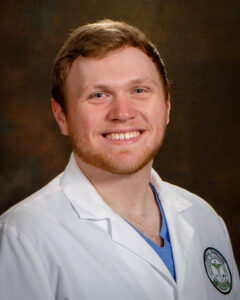
Evan Sosebee
Recognizing Evan for outstanding Political Advocacy at MTSA’s recent legislator visit. Evan interacted with the legislators with confidence and engaged them in a meaningful way, demonstrating professionalism and representing both the CRNA profession and MTSA positively.
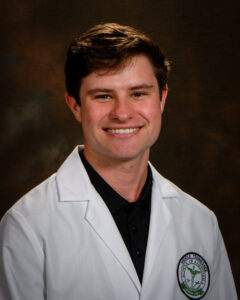
Brayden Timmons
Shoutout to Brayden for changing his scheduled shift [recently]. He was scheduled from 9 a.m. to 7 p.m., and the 11 a.m. to 9 p.m. student had called out sick. I texted him during the 6:30 meeting and asked him if he would be willing to switch. Not only did he switch last minute, but he was all smiles and super easy going about it all. It’s so helpful to have flexible students like him!
MTSA Launches Hornsby Business Institute
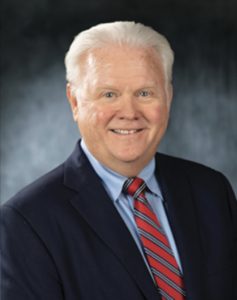
Middle Tennessee School of Anesthesia has announced the launch of the Hornsby Business Institute, which will offer a personalized pathway for CRNAs to learn the business of anesthesia and gain access to expert-level leadership skills.
HBI will be led by Larry Hornsby, one of the industry’s preeminent experts in the business of anesthesia, who has joined MTSA as the Institute’s Director.
Hornsby Business Institute will provide content that equips CRNAs to navigate the business aspects of anesthesia with confidence, enabling them to become leaders in the field. Courses will focus on specific skills, such as financials, contracts, HR, negotiations and more. Participants will be able to earn “Digital Badges,” continuing education credit, and college credit.
In addition, MTSA has identified a local MBA academic partner, which will enable students to transfer HBI credits into the MBA program for those who want to continue their academic journey.
“Across the country, many CRNAs own their own practices, providing anesthesia services to hospitals, office-based practices, surgery centers, and more,” said MTSA President Chris Hulin. “One of the reasons so many have been successful as business owners is because of Larry Hornsby. His legacy and expertise are unmatched in our field. That’s why we’ve decided to partner with him in launching the Hornsby Business Institute at MTSA.”
Future plans for HBI include the development specific pathways for entrepreneurs, corporate executives, and clinical leadership. An important element of these courses will be “coaching” calls with industry experts as well as one-on-one mentorships, providing a variety of tools to help ensure success for program participants.
“MTSA continues to lead the way when anesthesia providers face challenges in their career. HBI is another example of our commitment to providing educational content for CRNAs to help them be successful. We are thrilled to be working with Larry in building these academic programs,” Hulin added.
MTSA is planning to open enrollment for its first Hornsby Business Institute cohort later in 2024. Stay tuned for more information.
Learn more about Larry Hornsby, and read our extended conversation with him, below:
Airways: How did you get started in the business of anesthesia? Was it difficult to “break into”?
Hornsby: When it comes to the business of anesthesia, we don’t get any of that in anesthesia school. Neither do the anesthesiologists. We graduate with great clinical skills but with very limited knowledge of billing, collections and how the business side of anesthesia works. I graduated in 1985 and then a business opportunity presented itself in 1991. I was still pretty young at that point on the clinical side of things and had no expertise in the business. It was all new to me. But I started gaining experience, and I made a lot of mistakes – every mistake in the book. But I will say, I never made the same mistake twice.
Airways: How did you start sharing your knowledge of the business of anesthesia?
Hornsby: After working for a while, people started asking me about lecturing on the business of anesthesia. It was very difficult initially because our professional organization at that point didn’t offer continuing education credits for business topics, only clinical topics. So I started lecturing at universities and dinner meetings where people wanted to learn about the topic. Eventually our professional association agreed that the business of anesthesia was important enough to our profession to allow continuing education credits.
Airways: How did you build on that initial success?
Hornsby: Along the way I met another CRNA named Juan Quintana who is also a past president of AANA. We kept bumping into each other at state and national meetings. He was lecturing on business topics as was I. So we sat down and we realized that we were never going to be able to teach our fellow CRNAs what this is about unless we teach a real class. Soon after, we met Chris Hulin and ended up talking for several hours about the need for this educational content and the best ways to deliver it to a wider audience. That led to our video series, which we recorded and assembled into modules as an eight-week course.
Airways: What were some of the teaching methods you have used to educate CRNAs?
Hornsby: Across the country, hospitals were working on a request-for-proposal basis if they want to replace their anesthesia group. In most cases, CRNAs didn’t know how to respond. So we would take old responses to RFPs that we had done, redact the sensitive information, and use that as the basis for teaching CRNAs how to create hard-hitting proposals and helping them fill gaps in their knowledge of the business. Afterwards, we started hearing success stories from former students where they had successfully negotiated a contract and they were starting to pick up business.
Airways: What trends have you been seeing in the anesthesia field, especially in terms of the business side?
Hornsby: We’re seeing the largest shift in the history of our profession from W2 employee CRNAs to 1099 (independent contractor) arrangements. The important factor for these CRNAs is that you’re running your own business, for example as an S Corp or an LLC, and you’ve got to manage your own invoicing and tax considerations. So those individuals in our profession immediately understand the importance of learning the business side of anesthesia.
Airways: What does it mean to you to partner with MTSA on this project?
Hornsby: There’s nothing like this in the country. I’m very humbled that MTSA decided to name this the Hornsby Institute of Business. When Chris Hulin mentioned it, it kind of scared me a little bit. But I thought, if it’s going to bear my name, I have to make sure it’s first-class. I didn’t start this career looking for a legacy. I just wanted to be a good anesthetist, and it never occurred to me that I would start, build and grow this anesthesia management company. I started at an ambulatory surgery center in Montgomery, Alabama. The business just grew and grew. I merged with another company and eventually sold the business to a venture capitalist firm, and then I became a chief operating officer for a company in Dallas. I decided to “retire,” but that lasted about a week before I realized I wanted to keep working in the anesthesia world. I want to make sure that the Institute is successful on every level. I want it to be affordable and cost effective, and I want to teach CRNAs the skills that they’re going to need to be successful. This opportunity allows me to do something that I’ve never been able to do until now, and for that I’m very grateful.
ABOUT LARRY HORNSBY
Larry G. Hornsby, BSN, CRNA, FAANA, is a highly recognized expert in the business of anesthesia. He has owned and managed numerous health-related companies, including an anesthesia billing company, an anesthesia management and billing consulting service, multiple anesthesia companies providing anesthesia services to hospitals, surgery centers and physician practices, an anesthesia staffing company and an anesthesia continuing education seminar company. He is currently the Executive Vice President and Chief Strategy Officer for DPI Anesthesia, an anesthesia management company located in Baton Rouge, Louisiana.
Hornsby is a Past-President of the American Association of Nurse Anesthetists (AANA) and received the organization’s highest honor in 2013, the Agatha Hodgins Award for Outstanding Accomplishment. Prior to his term as president, he served on the AANA Board of Directors for four years, holding the offices of Region 7 Director, Vice President, and President-Elect, respectively. Notably, he served as Chairman of the AANA Commission on Anesthesia Economics and Reimbursement and as Chairman of the Anesthesia Payment Advisory Panel to the AANA Board of Directors. He chaired the AANA CRNA Political Action Committee for six years, as well, bringing in record-breaking contributions during his term. He also served on the Joint Commission on Accreditation of Healthcare Organizations Ambulatory Professional Technical Advisory Council for six years. Most recently, Hornsby was inducted into the inaugural class of AANA Fellows in 2021.
Prior to his AANA service, he served the Alabama Association of Nurse Anesthetists as a member of its Board of Directors, serving two terms as president and chairing several committees.
2023 Commencement Ceremony
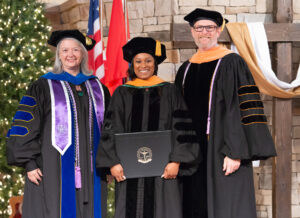
Middle Tennessee School of Anesthesia hosted Commencement Exercises for the Doctor of Nurse Anesthesia Practice Class of 2023 on Dec. 8, 2023, at the Madison Church of Christ.
The ceremony featured a keynote presentation by Dr. Ming Wang of Wang Vision Institute. In addition, graduates Brianda Garza and Jesse White offered the invocation and benediction; graduate Alexandria Boss introduced the keynote speaker; and graduate Victoria Leigh Adamson presented a musical performance, accompanied by Zach Stone.
GRADUATE AWARDS
During the ceremony, several awards were presented for special achievements:
President’s Medal
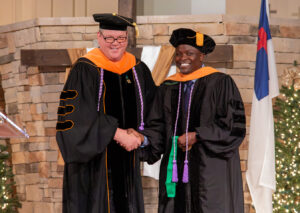
MTSA President Chris Hulin presented the President’s Medal to Andrew Gould and Crispus Nyambariga Ombui for their doctoral work titled, “An Evidence-Based Toolkit for Simulation Education in Regional Anesthesia.” The pair completed a literature review on the use of artificial intelligence for education of regional anesthesia. After doing an in-depth quality appraisal of the literature and learning more, they wanted to do more and decided their project needed to expand beyond artificial intelligence. They examined findings of previous works from MTSA doctoral students and decided to build on past projects. Along with the published works of previous students’ findings, they created an educational toolkit of the most effective evidence-based techniques for learning regional skills. Their work was presented at AANA Congress and has been submitted for publication.
Dr. Larry Lancaster Outstanding Nurse Educator Award
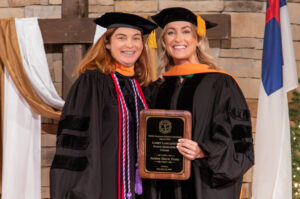
Hallie Evans, Director of the Doctorate Completion Program and Nurse Educator Track, presented the inaugural Dr. Larry Lancaster Outstanding Nurse Educator Award to Dr. Jordan Frenz, who graduated from the DNAP Completion program at the ceremony and is enrolled in the first nurse educator cohort. (See Dr. Frenz’s article in the Continuing Education insert in this issue of Airways.) She created an education podcast with her Doctoral project team on anesthesia techniques to decrease the risk of relapse for patients in recovery. In addition, she is the first postgraduate student to serve on a school committee. She actively serves on the Student Life Committee and is committed to health and wellness for students. She has also taken on the additional role as a teaching assistant and is a recipient of the Nurse Faculty Loan Program grant which provides funding for school in return for dedicating four years working as a nurse educator upon completion of the program.
Dr. Larry Lancaster was an educator at MTSA from 1998 to 2014. He was known for his rapport with students, love of teaching, and an ability to make difficult concepts easy to understand. He served as a mentor to many faculty members and received an honorary Doctorate from MTSA. He passed away in 2023, and the School established the award to honor both him and educators following in his path. The award is voted on by the Doctorate faculty.
Acute Surgical Pain Management Fellowship Outstanding Achievement Award
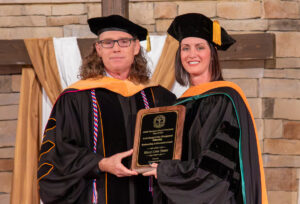
Christian Falyar, Director of the Acute Surgical Pain Management Fellowship, presented the MTSA Acute Surgical Pain Management Fellowship Outstanding Achievement Award to Kelly Lynn Terry. She is the chief CRNA at Christus Mother Frances Hospital in Jacksonville, TX, where she serves as the clinical coordinator for the entry to practice students at Texas Wesleyan University, mentoring them in the clinical setting. Falyar remarked that Terry’s desire and interest in acute pain management led her to enroll in the Fellowship and that she possesses a quiet confidence and superior technical ability required for the practice of acute pain management. Awardees for Outstanding Achievement are selected based on their ability to contribute to clinical expertise and scholarship, advance scope of practice, and develop innovative approaches to pain management, among other achievements.
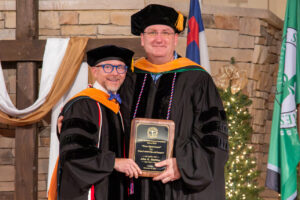
Team Spirit Award: Rob Mathias
This award is voted on solely by students and given to the person in their class who has continually offered encouragement and was always willing to lend a helpful hand.
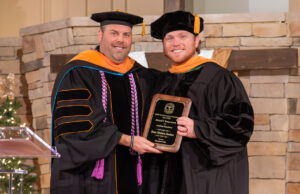
Bernard Bowen Award for Academic Excellence: Evan Matthew Sosebee
This award is named for the founder and first Program Director of the school of nurse anesthesia in 1950. The recipient was chosen by votes from the MTSA faculty and administration. The student selected for this award must have upheld the mission and core values of MTSA, achieved a GPA of 3.75 or higher, exhibited professionalism during interaction with classmates and academic faculty, and fostered a spirit of academic excellence beyond the expectations and degree requirements.
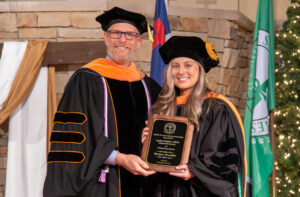
Agatha Hodgins Award for Clinical Excellence: Morgan Franklin
This award is named for the founder and first president of the American Association of Nurse Anesthetists. Ms. Hodgins was also a strong advocate for the education of nurse anesthetists. The clinical affiliates of Vanderbilt, along with MTSA Administration, had input into the selection of the recipient for this award. The student selected for this award must have upheld the mission and core values of MTSA, achieved a GPA of 3.75 or higher, and exhibited professionalism during interaction with clinical faculty and classmates, and fostered a spirit of clinical excellence beyond the expectations and degree requirements.
CLASS OF 2023 CLINICAL EXPERIENCE
Each year MTSA graduates well-exceed requirements of the National Board of Certification & Recertification for Nurse Anesthetist (NBCRNA) regarding the number of cases and procedures for clinical experiences in order for the candidate to be eligible to take the National Certification Examination.
The following statistics were derived from the information provided to the NBCRNA for certification requirements for the graduates as of Nov. 27, 2023.
NBCRNA requires a minimum number of 600 cases. The average number of cases performed by members of the class of 2023 was 906 cases. The graduate with the highest number of cases performed was Claire Hazlehurst who completed 1,144 cases.
NBCRNA requires a minimum of 2,000 hours of clinical time. The average number of clinical hours by the members of the class of 2023 was 2,883 hours. The graduate with the most hours in clinical was Kathleen Patten with 3,308 hours.
NBCRNA requires each graduate to have administered anesthesia to at least 40 pediatric patients. Members of the class of 2023 performed an average of 131 anesthetics for pediatric patients. The graduate with the highest number was Kathleen Patten with 245 pediatric cases.
NBCRNA requires each graduate to have provided anesthesia for at least 30 obstetrical patients. The average number of anesthetics in this category for members of the class of 2023 was 80. The graduate with the highest number was Chelsie Graves with 220 obstetrical patients.
Graduates from all programs across the United States are required to perform a minimum of at least 35 regional anesthetics. These 35 can be from a combination of all categories of regional anesthesia. The members of this graduating class administered an average of 110 regional anesthetics. Epidural and spinal anesthesia are techniques of regional anesthesia. The members of this class performed an average of 28 spinal anesthetics. The members of this class performed an average of 45 epidurals.
NBCRNA requires a total of 10 peripheral blocks. The members of this class performed an average of 32 peripheral blocks. The graduate with the highest number was Alexandria Boss, with 168 peripheral blocks.
Special Events in 2023
2023 Homecoming
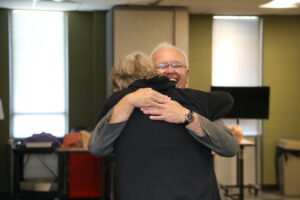
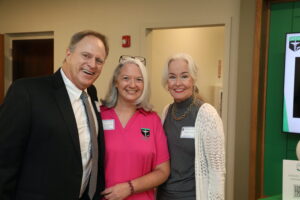
MTSA was pleased to welcome alumni to its 2023 Homecoming, which included poster presentations, dinner, recognition of “cherished friends,” and more.
The poster session, which was offered for two CEs, showcased the finished evidence-based research projects of MTSA DNAP students. The 21 posters were displayed digitally throughout the MTSA campus.
Steve Morris (’74) shared not only his extensive collection of historical anesthesia equipment but also the fascinating stories and background of the pieces in his collection. Steve took the time to restore two MTSA antique anesthesia machines, from dusty relics to pristine condition – now on display at the School. He also donated a third historical machine that was intended for use during the Cold War.
The “Mission Matters” slideshow enabled guests to see MTSA’s long history of service and missions. Mr. Bernard Bowen, the School’s founder, traveled worldwide with his beloved wife, Dolly, providing anesthesia in underserved countries while sharing his faith. MTSA carries this vision of service and mission work into the present day. The slideshow displayed during the Homecoming event gave tribute to MTSA mission trips spanning seven decades.
In addition, the Alumni Committee recognized four of the many non-alumni individuals who have played critical roles in the history of MTSA: Laurance “Larry” Lancaster, EdD, ACNP (posthumously); C. William “Bill” McKee, EdD; W.O.T. “Bill” Smith, MD; and Carol Stinson. Occasionally honoring selected non-CRNAs to become honorary MTSA Alumni Association members has been part of the bylaws of the MTSA Alumni Association since its inception in the early 1990s. However, this is the first time this honor has been given.
The award read as follows:
MTSA Honorary Alumni Award
In recognition of and appreciation for the exceptional commitment, loyalty, and love you have shown to MTSA, we, the MTSA Alumni, grant you Honorary Membership to the MTSA Alumni Association.
Thank you for your hard work and self-sacrifice on MTSA’s behalf.
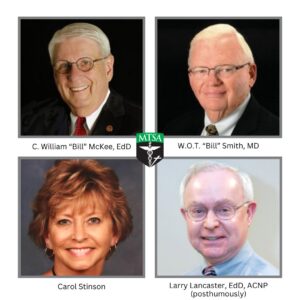
Larry Lancaster, Carol Stinson, Bill Smith, Bill McKee
W.O.T. “Bill” Smith, MD
(The Tribute was authored and given by Mary E. “Ikey” DeVasher at Alumni Homecoming 2023. The award was presented by Vic Martin, MBA, CRNA (1986), Past Alumni Association President & Current Chair of the MTSA Board of Trustees.)
Because of his 31 years of association with students, and because of his dedication to assuring that nurse anesthetists were well educated in clinical anesthesia, the Alumni Committee considers it only fitting that an anesthesiologist, Dr. William O. T. Smith should be the FIRST non-CRNA invited to be an honorary MTSA alumnus.
In 1973, Dr. Smith received a call from the then-Madison Hospital Administration to oversee activities of both the Hospital’s department of anesthesia and the Madison Hospital School of Anesthesia. He has indicated that his prime reason for responding positively to the call was his interest in anesthesia education. He has stated, “If nurses were going to do the job of a physician, I was determined to see that they were well prepared to do so.” Therefore, he uprooted his family from California and moved to Madison, Tennessee.
In 1973, his move to oversee a school of nurse anesthesia may not have been a popular move politically, as the attitude among many anesthesiologists as well as many nurses at that time, was that providing anesthesia was solely the practice of physicians; therefore, they believed nurses providing anesthesia were, in actuality, practicing medicine.
Dr. Smith oversaw the hiring of CRNAs to be both Clinical and Academic faculty for the school, and he participated in the selection of students whose aim was to become CRNAs. He was personally very active in clinical instruction. He taught as he had been taught, and sometimes that teaching methodology was not considered as “kind and sweet” as some may have preferred; rather, it could be firm and disciplined. However, his knowledge generated respect from students and CRNAs alike. Students noted that he also loved to have fun and had many hobbies. Many will remember he enjoyed eating and cooking, and when he occasionally cooked his recipe of “bananas foster” in the anesthesia workroom, it was a great treat.
Only those who know this school’s history know how close we came to not having a school of anesthesia. Only a decade after he arrived, in 1983, Madison Hospital divested itself of all educational programs, including nurse anesthesia. His response to that closure could be one of Dr. Smith’s finest hours. Madison Hospital School of Anesthesia became simply “School of Anesthesia, Inc.” – essentially homeless. In his first 10 years here, Dr. Smith had made friends with the anesthesiologists in the various hospitals where students affiliated and where graduates practiced. So, he and Dr. Nevin Downs, whom Dr. Smith had recruited to join him at the school of anesthesia in 1974, used their political capital and together visited each anesthesia group in Nashville, as well as the hospital administrators in the area to gather support for the school to remain locally.
From Madison Hospital, they garnered a promise that they would lease space, and later a building (now named after Bernard Bowen), at a nominal rate so the anesthesia school could continue on the campus where it was born.
To anesthesia groups, they noted that the large majority of anesthesia providers were graduates of Madison Hospital School of Anesthesia, and so achieved their continued support in providing clinical education. These assurances helped in the quest to keep the school in Madison. They formed a Board of Directors, applied for, and received 501(c)3 tax exempt status. With this status, anesthesia groups and other benefactors could give tax-exempt donations, which would help offset the actual cost of education.
While Mr. Bowen’s claim to fame was that he started the school of anesthesia in 1950, Dr. Smith saved the school in 1983, 40 years ago now!
By the time of his retirement in 2006, estimates indicate that Dr. Smith assisted in the education of over 1,000 nurse anesthetists. He indeed honored his statement that he was going to see that nurse anesthetists were prepared to do the job.
A statement from the book, Education, by a Christian author asks,“What is it worth to any life to have been God’s Instrument. . . ? What will it be worth in eternity to witness the results of such a life work? The answer is, it is Priceless. Dr. Smith, we, the alumni, believe YOU ARE PRICELESS. The alumni want to thank you for your many selfless sacrifices to ensure the success of MTSA!
Laurance, “Larry” Lancaster, EdD, ACNP (posthumously)
(The Tribute was authored and given by Mary E. “Ikey” DeVasher at Alumni Homecoming 2023. The award was accepted on Larry’s behalf, by MTSA’s President, Chris Hulin, DNP, MBA, CRNA (2006).)
The next non-CRNA invited to be an honorary MTSA alumnus is Dr. Larry Lancaster. In his 17 years with MTSA, he probably made one of the most lasting impressions on students and their lives, as anyone who has ever been involved in students’ academic success at MTSA. With sadness, he is recognized posthumously, as Dr. Lancaster passed away just a few weeks ago.
Dr. Lancaster was one of those instruments in helping MTSA as it began the long journey toward having the ability to offer our first graduate degrees at the Master’s level. In the late 1980’s, Vanderbilt School of Nursing assigned Larry to help develop a joint curriculum in the event MTSA and Vanderbilt could jointly conduct the program, which was unsuccessful. However, because of that relationship, his role in teaching physiology at Vanderbilt was noted by MTSA, and in 1998 when an opening for a physiology teacher at MTSA occurred, Larry was invited to fill that position. Ultimately, he taught courses in physiology, pharmacology, and research at MTSA. To say that MTSA students loved him would be an understatement. He was firm in his expectations, but students always knew his high expectations were for their benefit.
One of the unique things about Dr. Lancaster was his ability to think ahead about who would, could, or should replace him in teaching at MTSA when he retired. He spotted a young man in his physiology courses at Vanderbilt, Brett Clay, who wanted to become a nurse anesthetist. Larry encouraged him to apply at MTSA and was very pleased when Brett was accepted here. While Brett was still a student, Larry approached the Dean and told her that it was his expectation that Brett would be qualified to take his place when he retired.
When Dr. Lancaster retired, students grieved, as his reputation was sterling, and incoming students who knew about him were sad. Indeed, replacing someone like Dr. Lancaster could be a monumental undertaking. But true to his early thoughts, his recommendation of Brett Clay turned out to be a tremendous gift, as Brett follows closely in Dr. Lancaster’s footsteps, still to this day.
MTSA’s Alumni Committee had planned to honor Dr. Lancaster personally today. Sadly, Dr. Lancaster passed away just a few weeks ago, so this honor is given posthumously.
A statement from the book, Education, by a Christian author asks, “What is it worth to any life to have been God’s Instrument. . .? What will it be worth in eternity to witness the results of such a life work? We as alumni can answer, “the value was greater than fine gold!”, and Dr. Lancaster was PRICELESS! Rest in Peace Larry, and we plan to sit in your class once again in the new earth.”
Carol Stinson
(The Tribute was authored and given by Mary E. “Ikey” DeVasher at Alumni Homecoming 2023. The award was presented by Anita Turner, CRNA, current Alumni Committee member (1987, 1995)
Carol Stinson devoted about 33 years as one of the staff who was willing to serve MTSA wherever she was assigned, especially as related to student success, and whom the MTSA students loved.
Carol came to MTSA in 1989, when it was still located inside Tennessee Christian Medical Center (TCMC) on the same hall as Surgery, and for the first time ever, MTSA had two full-time staff to assist in affairs of the school. Carol held many roles as the school evolved from a certificate granting institution to a regionally accredited master’s-level institution. One of her earlier roles was helping with some of MTSA’s first student recruitment ventures. She was always cheerful, and her caring nature helped draw students to us. It was not uncommon for Carol to join me before work hours to walk around the TCMC pond and pray for MTSA and its students.
Carol’s organizational skills were a great help with maintaining and generating institutional statistics for accreditation purposes. However, her official job title became the Academic Support Coordinator. In this role, almost everything centered on student success, from Registrar to maintenance of academic course schedules. She was the coordinator of graduations, which included the graduation ceremony, as well as assuring that all students’ records were complete and submitted to NBCRNA so graduates could take the national certification examination promptly.
Students who enjoyed basketball, and particularly those who rooted for Vanderbilt Men’s basketball, always found a friend in Carol. Her carrot cakes were the best, and her Christmas fudge was wonderful.
A statement from the book, Education, by a Christian author asks,“What is it worth to any life to have been God’s Instrument. . . ? What will it be worth in eternity to witness the results of such a life work? Carol, your work has been highly treasured! We, the alumni, believe YOU ARE PRICELESS, and we thank you for your loyalty and willingness to be God’s instrument at MTSA.
William “Bill” McKee, EdD
(The Tribute was authored by Mary E. “Ikey” DeVasher but not given at the Homecoming event, due to Dr. McKee being unexpectedly unable to attend. The award was presented to Dr. McKee the following week by Mary E. “Ikey” DeVasher, CRNA, Dean Emeritus, current Alumni Committee Member (1969 and 1994).
Dr. C. William McKee who is currently Cumberland University’s Provost and Vice President for Academic Affairs. He is honored for his role in advising and consulting with MTSA leaders in the quest to move MTSA from a certificate-granting program to becoming a single-purpose, regionally accredited graduate school of nurse anesthesia. This seminal event set in place the ability for MTSA to become the educational institution it is today.
Dr. McKee was one of the individuals who encouraged the administration at MTSA to seek independent, regional accreditation with the Commission on Colleges of the Southern Association of Colleges and Schools (SACSCOC). He did not “just” advise MTSA about the process; instead, he became a shepherd, guiding MTSA through the process.
In our early meetings with him, MTSA asked if Cumberland University would be interested in having MTSA and Cumberland jointly offer a master’s degree to MTSA graduates. At no time was this encouraged by Dr. McKee. I am sure part of that was because Dr. McKee knew Cumberland could not offer a joint degree with MTSA, because MTSA was not yet regionally accredited. Also, he did not propose that Cumberland envelop MTSA, as one of the other local universities had done. However, he invited me to join him and Cumberland’s President on a trip to Atlanta, where they would be having a conference with a representative of SACS. At that SACS meeting, my education about regional accreditation began, and throughout the process of achieving it, Dr. McKee was there. He spent hours assuring the application to SACS was appropriately written. When MTSA first received permission to offer Master’s level courses in 1993, he and two other faculty from Cumberland became adjunct faculty of MTSA, teaching Education, Research, and Statistics courses. Later, he agreed to serve on the MTSA Board of Trustees.
At one time, I asked why he did not encourage either a joint degree or envelopment. His comment then gave evidence of his character. He said, “I want to do the right thing because it is the right thing to do!! MTSA does not need to join any university; it needs to be accredited as a single purpose, anesthesia specific, graduate school of nurse anesthesia.”
A statement from the book, Education, by a Christian author asks two questions, “What is it worth to any life to have been God’s Instrument? What will it be worth in eternity to witness the results of such a life work? In short, your work has been beyond price. MTSA has been just one school blessed by your tireless efforts to see it achieve, and the MTSA alumni thank you for shepherding our school to make graduate education a reality.
Topgolf
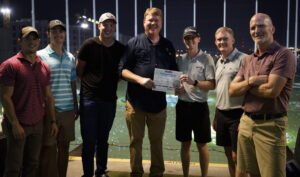

MTSA teed up its inaugural Golf Tournament at Topgolf Nashville, presented by US Anesthesia Partners Tennessee, in September. Proceeds from the event supported Mission Initiatives in Peru and Guyana, where the school provides equipment and simulation training for nursing students studying to be CRNAs. Funding for medical supplies and education curricula for this program makes a lasting impact by improving patient care.
Attendees took a swing at enjoying food, networking, and tournament play – all for a great cause. Special thanks to sponsors: US Anesthesia Partners Tennessee and Sweet Dreams Anesthesia.
“Hello Summer” Grillout/Bakeoff
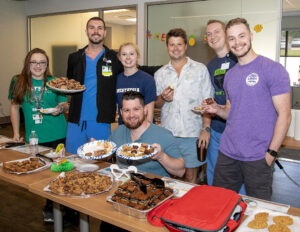
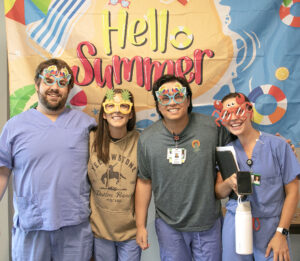
The School Life Committee at MTSA sponsors one event each semester for students, staff and faculty to come together for a meal and fellowship. The 2023 summer event, “Hello Summer,” included a grillout/bakeoff contest.
Legislator Open House
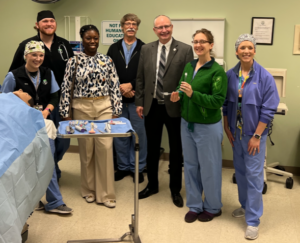
Tennessee state Senator Charlane Oliver and Representative William Slater practice their intubation skills as part of MTSA’s Legislator Open House. Tennessee state legislators were invited to campus to educate them on the CRNA role and value that MTSA brings to the medical community.
Upcoming Events
March 14 – Prospective Student Open House for Practice Doctorate Program, 12:00 p.m. (check in and lunch from 11 a.m. to 12 p.m.)
Prospective students will have the opportunity to meet with MTSA faculty, staff, and current students to learn more about the DNAP Practice Doctorate program as well as their opportunities as an MTSA student.
May 2 – Mission & Awards Gala, Nashville City Club. More details coming soon at www.mtsa.edu/gala.
The School Life Committee and Wellness Initiative at MTSA, in collaboration with the MTSA Alumni Committee, invites interested alumni to join students for the following events throughout the year. The goal is to develop and nurture mutually beneficial relationships between alumni and current MTSA students, by sharing experiences and fostering new friendships.
Select Thursdays | 8 – 9:30 a.m. – Waffles and Wisdom
Beginning in their fifth semester, students take one day per month away from clinical to spend the day on campus studying for the certification exam. These are stressful times for the students, and some wisdom from those who have walked in their shoes can be extremely helpful. Alumni interested in helping with “Waffles and Wisdom” on those days are invited to contact sharon.harmon@mtsa.edu.
July – Summer Picnic/Bakeoff (Date TBD)
Enjoy fellowship with students during lunch and a bakeoff contest. Guests are invited to entering their favorite recipe in the contest.
November – Service Month
Join students as they take the opportunity to give back to the community in gratitude for the blessings we share. Various opportunities throughout the month of November for volunteer service events.
Nurse Anesthesia Programs
MTSA is accepting applications for a wide range of nurse anesthesia programs to help you excel as a CRNA. Visit mtsa.edu/apply for details.
DNAP Completion Program
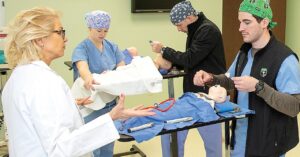
Application Deadline: April 1, 2024
The Doctor of Nurse Anesthesia Practice (DNAP) Completion program is specifically designed with the working CRNA in mind and in an online format. All students accepted into the program must be currently licensed CRNAs. The program can be completed over two years, and applicants can choose one of two tracks: Nurse Educator or Acute Surgical Pain Management Fellowship.
Acute Surgical Pain Management Fellowship
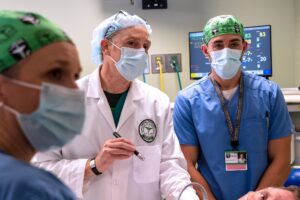
Application Deadline: April 1, 2024
As the only Fellowship of its kind for CRNAs in the United States accredited by the Council on Accreditation of Nurse Anesthesia Educational Programs (COA), the Acute Surgical Pain Management Fellowship is a 12-month hybrid program designed to expand a CRNA’s regional anesthesia skills and provide the tools necessary for incorporating an acute pain service into their practice.
Nurse Anesthesia Educator Track
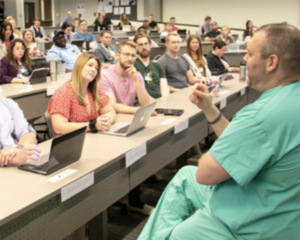
Application Deadline: April 1, 2024
MTSA’s Nurse Anesthesia Educator Track is a 12-month course of study that prepares students to excel in the Nurse Educator role. With so many nurse anesthetists graduating with Doctoral degrees, set yourself apart by completing education courses designed to help you stand out as an educator. This program covers all facets of higher education from teaching strategies to curriculum development.
Advanced Physiologic Foundations
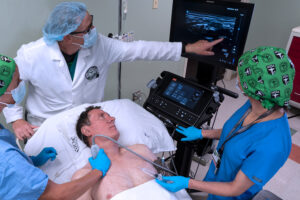
Application Deadline: March 18, 2024
Specifically for RNs, the Advanced Physiologic Foundations course discusses advanced human physiologic concepts at the system, organ, cellular, and subcellular levels, with the overall goal to enhance the learner’s foundation for nursing practice. Don’t miss this opportunity to expand your knowledge! Classes begin May 6, 2024.
DNAP Practice Doctorate Program
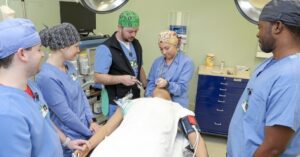
Application Deadline: May 31, 2024
The Doctor of Nurse Anesthesia Practice (DNAP) degree is the highest practice degree in nurse anesthesia. MTSA offers the DNAP Practice Doctorate to registered nurses who have met each of the application requirements for admission. The DNAP Practice Doctorate is a full-time course of study for 36 consecutive months, on the campus of MTSA. In the third semester of the DNAP program, students will begin a rigorous clinical rotation process that offers students a vast array of clinical experiences in the peri-anesthesia setting. These clinical rotations will allow students to learn and sharpen their anesthetic skills throughout the remainder of the program.
Workshops
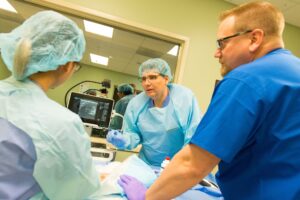
Regional Cadaveric Workshops
Ultrasound-guided regional anesthesia cadaveric workshops at MTSA incorporate anatomic dissection, live model scanning, and procedural cadavers to provide a comprehensive overview of the regional anesthesia procedures commonly used in the management of perioperative pain. The workshops are clinically focused, and techniques learned are easily translated into a provider’s daily practice.
Workshop Schedule:
March 24, 2024 – Advanced Workshop
May 5, 2024 – Essentials Workshop
July 14, 2024 – Advanced Workshop
Sept. 8, 2024 – Essentials Workshop
Oct. 27, 2024 – Essentials Workshop
Dec. 8, 2024 – Essentials of USGRA Cadaveric Workshop
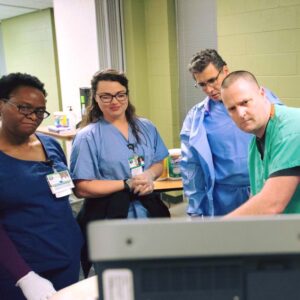 Point-of-Care Ultrasound (PoCUS) Workshops
Point-of-Care Ultrasound (PoCUS) Workshops
The Essentials Point-of-Care Ultrasound (PoCUS) Workshop is designed to introduce the participants to PoCUS studies that can be used as part of patient assessment in everyday clinical practice. Participants must complete the Essential PoCUS Online modules prior to attending the workshop. During the workshop, participants will learn to perform the studies on live models, high-fidelity simulation, and cadaveric specimens. Participants will complete a competency-based evaluation with course instructors to demonstrate proficiency.
Workshop Schedule:
May 6, 2024 – Essentials PoCUS Workshop
July 15, 2024 – Essentials PoCUS Workshop
Oct. 28, 2024 – Essentials PoCUS Workshop
Regional Anesthesia Foundations Class
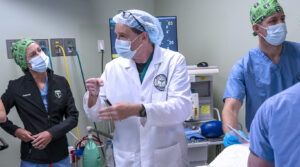
Application Period: May 13 – July 15, 2024
Unlock your potential in regional anesthesia with the Regional Anesthesia Foundations Class! We offer a unique opportunity for CRNAs to engage with and receive invaluable feedback from our experienced faculty prior to attending the Essential Ultrasound-Guided Regional Anesthesia Cadaveric Workshop. MTSA’s Regional Anesthesia Foundations Class is a comprehensive 15-week post-graduate course designed for CRNAs seeking to broaden their scope of practice by incorporating regional anesthesia.
For more information on all of MTSA’s nurse anesthesia programs, visit mtsa.edu/academics.
10th Annual Mission & Awards Gala
Presenting Sponsor: U.S. Anesthesia Partners
MTSA invites you to join colleagues and friends for an evening of celebration and dining at the 10th Annual Mission & Awards Gala sponsored by U.S. Anesthesia Partners, benefiting MTSA’s Mission Initiatives both locally and abroad. Each year, proceeds from the event fund supplies, education curricula, and other needed items for mission activities.
For more information or to purchase individual tickets, sponsorships or tables, visit mtsa.edu/gala.
Date: Thursday, May 2
Location: Nashville City Club, 200 2nd Ave S, Nashville, TN
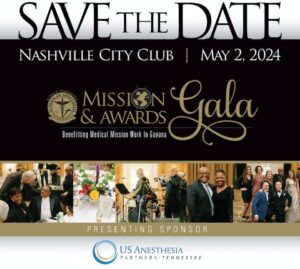
About the Awards
MTSA’s Mission & Awards Gala includes an award ceremony based on nominees chosen by alumni and friends. To submit a nomination, visit www.mtsa.edu/gala. The award categories include:
The Mary Elizabeth “Ikey” DeVasher Distinguished Alumni Service Award is awarded to a MTSA alumnus in honor of this MTSA alumnus and former Dean/Vice President/Program Administrator to celebrate and honor her years of dedicated work and distinguished service to the institution.
The Mission & Heritage Award is awarded to an individual who embodies and exemplifies the heritage, mission and core values of MTSA.
The William O.T. Smith Clinical Excellence Award is awarded to an anesthesia provider (anesthesiologist or CRNA) or clinical site (hospital, clinic, etc.) that provides a nurturing and exemplary atmosphere with true eagerness to instruct, train and educate MTSA students. The recipient will embrace the MTSA mission and core values.
The Nevin Downs Leadership Award is awarded to an anesthesia provider (anesthesiologist or CRNA) who personifies the integrity, honesty, fairness and exemplary leadership with which Dr. Downs served the profession including his advocacy of nurse anesthesia and MTSA.
2023 White Coat Ceremony
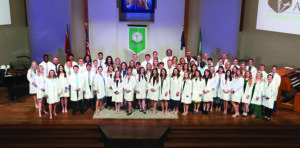
Each year at its White Coat Ceremony, MTSA recognizes first-year students’ successful completion of the second semester of the DNAP program including skills testing and machine check off. Family and friends gathered at the Madison Campus Seventh-day Adventist Church as the Class of 2025 received their official MTSA lab coat.
News & Notes
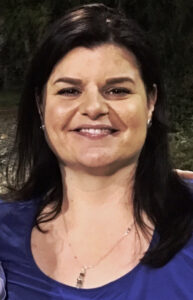
Navigating the Road Back to Student Life
By Kerrie Klein, MSN, CRNA
I want to say it was an easy decision to return to school for my Doctorate in Nurse Anesthesia Practice (DNAP), but that would be an exaggeration of the truth. After the rigor of my anesthesia education, I decided my student career had happily ended. However, as I practiced as a CRNA, I slowly realized I had more to do…but what? What was this thing I needed to do?
I started by becoming more involved in my anesthesia department. I participated in practice groups and became a Kaiser Permanente Nurse Anesthetist Association (KPNAA) representative. I became more active in the California Nurse Anesthetists Association (CANA), and developed a passion for promoting the visibility of CRNA practice to the public. I also felt compelled to cultivate the professional image of CRNAs. I joined the National Board for Certification and Recertification of Nurse Anesthetists (NBCRNA) on the Standard Setting Panel in Chicago. I felt involved and settled in my career—I loved my practice, gave back to the profession, and finally felt comfortable in my clinical role (we chose a challenging specialty!).
Then it happened… I was asked to lecture at my alma mater, Kaiser Permanente School of Anesthesia (KPSAN). At first, I scoffed at the proposition. Indeed, there were more qualified and experienced CRNAs to lecture at KPSAN. While pondering, one of my former faculty mentors contacted me and urged me to strongly consider lecturing. She told me my experience and perspective were ideal for the lecture, and she admitted to giving the program director my name as a suggestion. After her persuasion, I nervously agreed. On the day of the presentation, I was incredibly nervous—I once sat in the seats these students occupied. I know the discerning and demanding nature of the anesthesia student.
As I began the presentation, I relaxed. I made a few jokes, and the students laughed. I explained the topic in a way I would like to hear it as an anesthesia student—real, practical, and applicable. Being in front of the class felt natural, and I finished the lecture with a smile. A few days later, my faculty mentor told me the students had given resoundingly positive feedback. I was surprised and delighted. Just maybe there was more for me to do in my career… That week, I started looking at DNAP programs and applied to MTSA.
So here I am, about to start my second semester of the DNAP-C program at MTSA. Honestly, it has been a difficult transition back into student life. Balancing school, a demanding full-time career as a CRNA, my mental and physical health, and my family has been challenging—even more so, the technology… oh my, the technology. The DNAP-C is a strictly online program, so being technologically savvy is imperative. There were times during the first semester I was overwhelmed and anxious about the technology. However, the MTSA faculty and staff were incredibly supportive and patient. Having an all-CRNA faculty is incredibly advantageous, as I know my faculty understands the rigor and stress of practicing anesthesia. Additionally, when conferring with faculty and staff on research and projects, their viewpoint is one of a practicing CRNA and not a pure academic.
After I finish my DNAP, I plan to teach. I am excited to share the knowledge I have gained from my preceptor CRNAs. More importantly, I feel compelled to connect with anesthesia students. I want my students to feel supported, understood, and passionate about the CRNA profession. After all, they have chosen the most satisfying, challenging, and admirable career.
MTSA Calendar
Subject to change
March 14 – Prospective Student Open House for Practice Doctorate Program
March 24 – Advanced USGRA Cadaveric Workshop
March 26 – Career Fair
April 1 – Deadline to apply to Doctorate Completion Program
April 1 – Deadline to apply to Acute Surgical Pain Management Fellowship
April 1 – Deadline to apply to Nurse Anesthesia Educator Track
April 1 – Deadline to apply to Advanced Physiologic Foundations Class
May 2 – 10th Annual Mission & Awards Gala
May 5 – Essentials of USGRA Cadaveric Workshop
May 6 – Essentials PoCUS Workshop
May 31 – Deadline to apply to Doctor of Nurse Anesthesia Practice Program
July 14 – Essential USGRA Cadaveric Workshop
July 15 – Essentials PoCUS Workshop
July 15 – Deadline to apply to Regional Anesthesia Foundations Class
Sept. 8 – Essentials of USGRA Cadaveric Workshop
Oct. 27 – Essentials of USGRA Cadaveric Workshop
Oct. 28 – Essentials PoCUS Workshop
Dec. 8 – Essentials of USGRA Cadaveric Workshop
For additional details, visit mtsa.edu/events.


